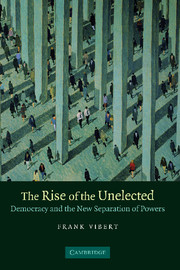Book contents
- Frontmatter
- Contents
- List of boxes, tables and figures
- Acknowledgements
- Introduction
- 1 The world of the unelected
- 2 The driving forces
- 3 The advantages of the new separation of powers
- 4 The challenge to conventional democratic theory
- 5 Adapting traditional approaches
- 6 The new separation of powers and the advent of the informed citizen
- 7 Informed citizens and the changing role of traditional institutions
- 8 The legitimacy of the new branch
- 9 The new separation of powers and the European Union
- 10 International institutions: blurring the boundaries
- 11 Conclusions: the accountability of the new branch
- Appendix: List of unelected bodies referred to in the text
- Bibliography
- Index
2 - The driving forces
Published online by Cambridge University Press: 22 September 2009
- Frontmatter
- Contents
- List of boxes, tables and figures
- Acknowledgements
- Introduction
- 1 The world of the unelected
- 2 The driving forces
- 3 The advantages of the new separation of powers
- 4 The challenge to conventional democratic theory
- 5 Adapting traditional approaches
- 6 The new separation of powers and the advent of the informed citizen
- 7 Informed citizens and the changing role of traditional institutions
- 8 The legitimacy of the new branch
- 9 The new separation of powers and the European Union
- 10 International institutions: blurring the boundaries
- 11 Conclusions: the accountability of the new branch
- Appendix: List of unelected bodies referred to in the text
- Bibliography
- Index
Summary
Conventional explanations for the growth in the numbers and variety of unelected bodies focus on the demanding external environment facing modern governments and the pressures for managerial reform that this created. Such managerial accounts offer important but insufficient explanations. They avoid talking about how public policy is formed. Public policy formation involves two elements – empirical judgements about the facts and political and ethical judgements about the values involved. This leads to a different type of rationale for the creation of unelected bodies – an institutional separation between bodies responsible for the two different types of judgement. Unelected bodies take on a special responsibility for empirical judgements in policy-making and elected bodies focus on value judgements.
The shift to a service economy
The most general explanation for the growth of unelected bodies lies with the forces of ‘globalisation’. Globalisation opened up to a broader array of external influences previously sheltered activities, including government structures and government policy-making. Change became inevitable.
Because it is such a broad term, ‘globalisation’ by itself is an unsatisfactory explanation in this area just as it is in others. A slightly more precise explanation is that the changes in the structure of government have paralleled broad changes in the structure of the economies of developed countries. The change of particular relevance has been the striking switch in recent decades away from output from manufacturing and industrial activity to output from the service economy.
- Type
- Chapter
- Information
- The Rise of the UnelectedDemocracy and the New Separation of Powers, pp. 34 - 41Publisher: Cambridge University PressPrint publication year: 2007

